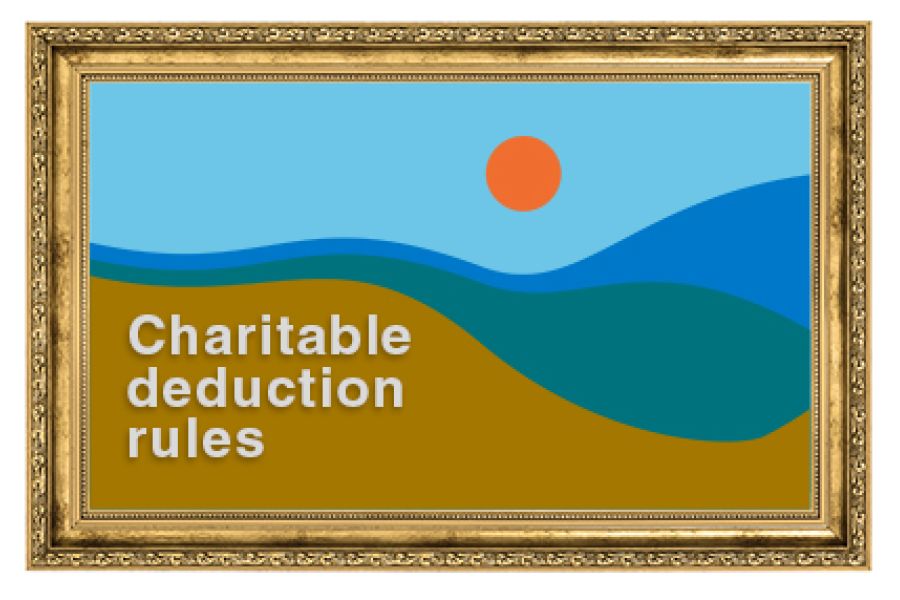As we approach the holidays, many people plan to donate to their favorite charities or give money or assets to their loved ones. Here are the basic tax rules involved in these transactions. Donating to charity Normally, if you take the standard deduction and don’t itemize, you can’t claim a deduction for charitable contributions. But for 2021 under a COVID-19 relief law, you’re allowed to claim a limited deduction on your tax return for cash contributions made to qualifying charitable organizations. You can claim a deduction of up to $300 for cash contributions made during this year. This deduction increases to $600 for a married couple filing jointly in 2021. What if you want to give gifts of investments to your favorite charities? There are a couple of...

Are you considering a relocating to another state when you retire? Perhaps you want to relocate to an area where your loved ones live or where the weather is more pleasant. But while you’re thinking about how many square feet you’ll need in a retirement home, don’t forget to factor in state and local taxes. Establishing residency for state tax purposes may be more complicated than it initially appears to be. What are all applicable taxes? It may seem like a good option to simply move to a state with no personal income tax. But, to make a good decision, you must consider all taxes that can potentially apply to a state resident. In addition to income taxes, these may include property taxes, sales taxes and estate taxes. If...
Employers offer 401(k) plans for many reasons, including to attract and retain talent. These plans help an employee accumulate a retirement nest egg on a tax-advantaged basis. If you’re thinking about participating in a plan at work, here are some of the features. Under a 401(k) plan, you have the option of setting aside a certain amount of your wages in a qualified retirement plan. By electing to set cash aside in a 401(k) plan, you’ll reduce your gross income, and defer tax on the amount until the cash (adjusted by earnings) is distributed to you. It will either be distributed from the plan or from an IRA or other plan that you roll your proceeds into after leaving your job. Tax advantages Your wages or other compensation...
Have you heard of the “nanny tax?” Even if you don’t employ a nanny, it may apply to you. Hiring a house cleaner, gardener or other household employee (who isn’t an independent contractor) may make you liable for federal income and other taxes. You may also have state tax obligations. If you employ a household worker, you aren’t required to withhold federal income taxes from pay. But you can choose to withhold if the worker requests it. In that case, ask the worker to fill out a Form W-4. However, you may be required to withhold Social Security and Medicare (FICA) taxes and to pay federal unemployment (FUTA) tax. 2021 and 2022 thresholds In 2021, you must withhold and pay FICA taxes if your household worker earns cash...
If you’re fortunate enough to own a vacation home, you may want to rent it out for part of the year. What are the tax consequences? The tax treatment can be complex. It depends on how many days it’s rented and your level of personal use. Personal use includes vacation use by you, your relatives (even if you charge them market rent) and use by nonrelatives if a market rent isn’t charged. Less than 15 days If you rent the property out for less than 15 days during the year, it’s not treated as “rental property” at all. In the right circumstances, this can produce revenue and significant tax benefits. Any rent you receive isn’t included in your income for tax purposes. On the other hand, you can...
If you own a valuable piece of art, or other property, you may wonder how much of a tax deduction you could get by donating it to charity. The answer to that question can be complex because several different tax rules may come into play with such contributions. A charitable contribution of a work of art is subject to reduction if the charity’s use of the work of art is unrelated to the purpose or function that’s the basis for its qualification as a tax-exempt organization. The reduction equals the amount of capital gain you’d have realized had you sold the property instead of giving it to charity. For example, let’s say you bought a painting years ago for $10,000 that’s now worth $20,000. You contribute it...
Studies have found that more people are engaging in online gambling and sports betting since the pandemic began. And there are still more traditional ways to gamble and play the lottery. If you’re lucky enough to win, be aware that tax consequences go along with your good fortune. Review the tax rules Whether you win online, at a casino, a bingo hall, a fantasy sports event or elsewhere, you must report 100% of your winnings as taxable income. They’re reported on the “Other income” line of your 1040 tax return. To measure your winnings on a particular wager, use the net gain. For example, if a $30 bet at the racetrack turns into a $110 win, you’ve won $80, not $110. You must separately keep track of losses....
Given the escalating cost of health care, there may be a more cost-effective way to pay for it. For eligible individuals, a Health Savings Account (HSA) offers a tax-favorable way to set aside funds (or have an employer do so) to meet future medical needs. Here are the main tax benefits: Contributions made to an HSA are deductible, within limits, Earnings on the funds in the HSA aren’t taxed, Contributions your employer makes aren’t taxed to you, and Distributions from the HSA to cover qualified medical expenses aren’t taxed. Who’s eligible? To be eligible for an HSA, you must be covered by a “high deductible health plan.” For 2021, a high deductible health plan is one with an annual deductible of at least $1,400 for self-only coverage,...
Many homeowners across the country have seen their home values increase recently. According to the National Association of Realtors, the median price of homes sold in July of 2021 rose 17.8% over July of 2020. The median home price was: $411,200 in the Northeast, $275,300 in the Midwest, $305,200 in the South, and $508,300 in the West. Be aware of the tax implications if you’re selling your home or you sold one in 2021. You may owe capital gains tax and net investment income tax (NIIT). Gain exclusion If you’re selling your principal residence, and meet certain requirements, you can exclude from tax up to $250,000 ($500,000 for joint filers) of gain. To qualify for the exclusion, you must meet these tests: You must have owned the property for...
As we approach the holidays and the end of the year, many people may want to make gifts of cash or stock to their loved ones. By properly using the annual exclusion, gifts to family members and loved ones can reduce the size of your taxable estate, within generous limits, without triggering any estate or gift tax. The exclusion amount for 2021 is $15,000. The exclusion covers gifts you make to each recipient each year. Therefore, a taxpayer with three children can transfer $45,000 to the children every year free of federal gift taxes. If the only gifts made during a year are excluded in this fashion, there’s no need to file a federal gift tax return. If annual gifts exceed $15,000, the exclusion covers the...











